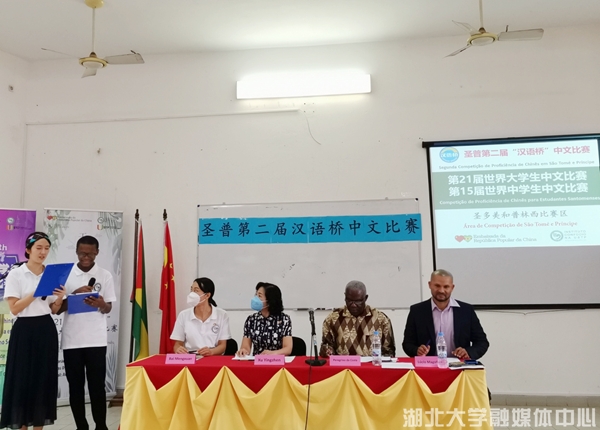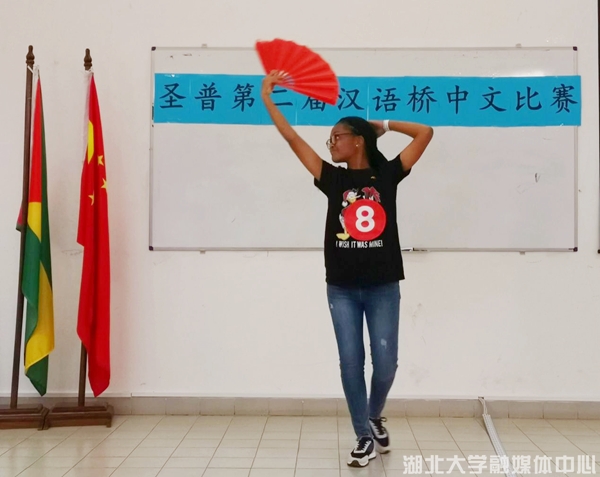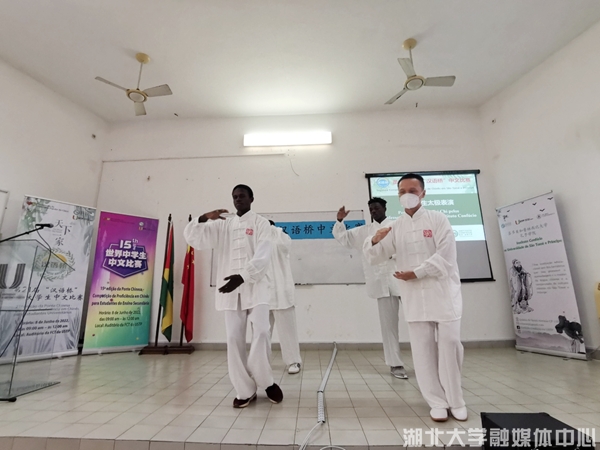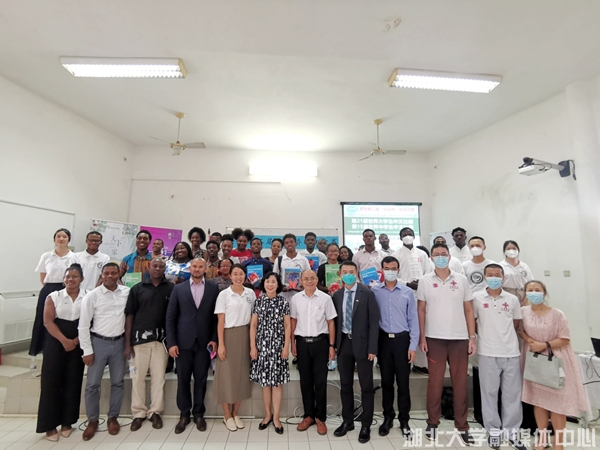On June 8th, the regional finals of the 21st “Chinese Bridge” Chinese Proficiency Competition for Foreign College Students and the 15th “Chinese Bridge” Chinese Proficiency Competition for Foreign Secondary School Students, which are hosted by Chinese Embassy of Sao Tome and Principe and organized by Confucius Institute at University of Sao Tome and Principe, were successfully held. Xu Yingzhen, Chinese Ambassador to Sao Tome and Principe, Peregrino da Costa, Rector of University of Sao Tome and Principe, and more than 100 teachers and students attended the event.
Ambassador Xu Yingzhen said in her speech that language is the most important communication tool for human beings. Since its establishment in 2019, Confucius Institute at USTP has trained more than 600 students, making positive contributions to strengthening the friendship between China and Sao Tome and Principe. The Chinese side will continue to support the development of the education in Sao Tome and Principe, so that more students in Sao Tome and Principe can use Chinese as the key to open the door to understand China’s development and Chinese culture, tell Chinese stories to their compatriots, and become envoys of friendship to promote exchanges and cooperation between the people of China and Sao Tome and Principe.
In his speech, Rector Peregrino da Costa noted that the theme of this year’s “Chinese Bridge” competition is “One World, One Family”, which is highly consistent with the relationship and common interests between Sao Tome and Principe and China. At present, the relationship between the two countries is at the best stage, and exchanges and cooperation in the field of people-to-people and cultural exchanges are constantly expanding. University of Sao Tome and Principe is willing to continue to vigorously promote Chinese education and make due contributions to enhancing mutual understanding and friendship between the two peoples.
Lúcio Magalhães, the director of the Confucius Institute, encouraged the contestants to promote their own development through learning Chinese, and said that the Confucius Institute would make unremitting efforts to deepen the language and cultural exchanges between the two peoples. Arminda Ceita, the receipiant of Chinese Government Scholarship, embraved young people in Sao Tome and Principe to learn Chinese with her experience of studying for a master’s degree in Hubei University, which she emphasized, would add help to broaden personal development path and contribute to the mutual understanding between the two peoples.
The competition consisted of Chinese speeches, Chinese talent show, China’s national conditions knowledge quiz. Eight contestants respectively from the college students and secondary school students who won the online preliminaries participated in the competition in turn. In the end, Ruth Penhor, a student from University of Sao Tome and Principe, and Valdemar Seng-Vaou, a student from Liceu Nacional, won the champions of each group. The two will represent Sao Tome and Principe in the African intercontinental rematch.
During the break of the competition, the teacher and students of the Confucius Institute gave performance of poetry recitation and Tai Chi, which won rounds of applause from the audience.
The “Chinese Bridge” Chinese Proficiency Competition is an international competition that Chinese learners from all over the world pay close attention to and actively participate in. It aims to provide a platform for Chinese learners to display Chinese, exchange learning experiences and examine their learning outcomes, and to enhance the understanding of Chinese and Chinese culture among the people of all countries.
Before the event, Ambassador Xu Yingzhen visited the Confucius Institute and held a meeting with Rector Peregrino da Costa. They exchanged views on issues such as exchanges between Hubei Universities and University of Sao Tome and Principe, and the development of Confucius Institute at University of Sao Tome and Principe.



